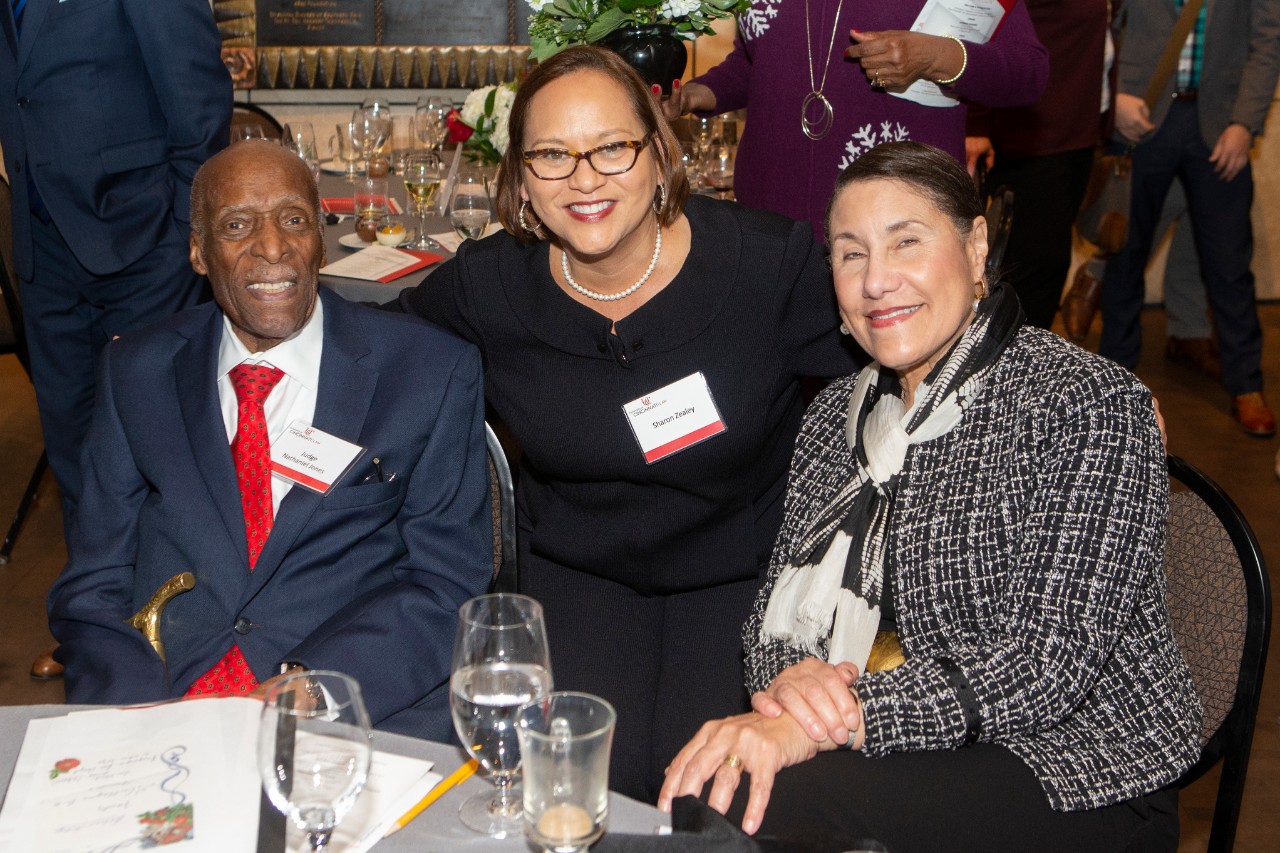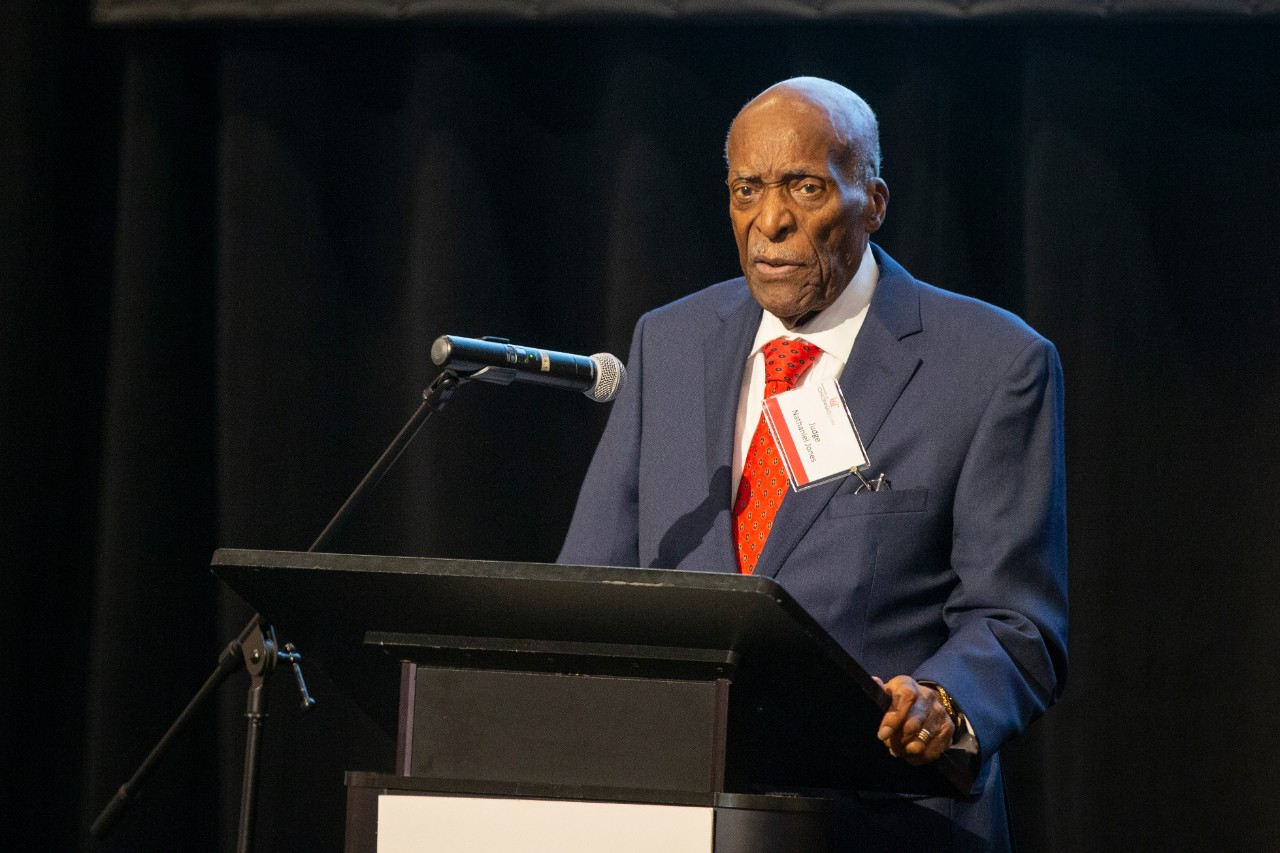
UC remembers Judge Nathaniel R. Jones
Civil rights icon and adopted UC College of Law alum leaves legacy of importance of social justice
Civil rights leader, activist and retired federal judge Nathaniel R. Jones will be remembered by the University of Cincinnati and UC College of Law communities as an attorney, distinguished jurist, academic, public servant and renowned defender of social justice.
Judge Jones died Sunday, Jan. 26. He was 93. Funeral services are pending.
In talking about his life and legacy recently, Jones said “I would like to be considered a link in the chain of change."
“Judge Jones is woven into the tapestry of social justice work here [at the College of Law], nationally and internationally,” said Verna L. Williams, the college's dean.
The College of Law last year rededicated its Center for Race, Gender, and Social Justice in honor of Judge Jones.
The early years
Jones was born on May 13, 1926, in Youngstown, Ohio. During World War II he served with the U.S. Air Force. After the war, he attended Youngstown State University, receiving his A.B. in 1951 and his LL.B. in 1956. He was admitted to the bar in 1957.
Because Youngstown State University closed, Jones was adopted by the UC College of Law and is considered one of its distinguished alumni. In addition, he received an honorary doctorate in 1996.
After several years in private practice, Jones served as executive director of the Fair Employment Practices Commission and then as an assistant U.S. attorney for the Northern District of Ohio in Cleveland. He held that position until he was appointed assistant general counsel to President Lyndon Johnson's National Advisory Commission on Civil Disorders (referred to as the Kerner Commission). Following his term with the Commission, Jones returned to private practice.

In 1969 Jones was named general counsel of the National Association for the Advancement of Colored People (NAACP), and for the next decade directed all NAACP litigation. In this role, Jones coordinated attacks against Northern school segregation, twice arguing in the pivotal U.S. Supreme Court case Bradley v. Milliken, which addressed school desegregation in Detroit. He also led the national response to attacks against affirmative action, spearheading and arguing many of the effort’s signal legal cases.
Jones's work also included investigating discrimination against black servicemen in the U.S. military, and successfully coordinating the NAACP's defense in the Mississippi Boycott case.
For decades - from here to South Africa - you’ve helped advance the cause of justice.
President Barack Obama
Becoming a Jurist
In 1979, then-President Jimmy Carter appointed Jones to the U.S. Court of Appeals for the Sixth Circuit, where he served as judge for more than 22 years.
Jones also played an important role in furthering the abolition of apartheid in South Africa. He consulted with drafters of South Africa’s new constitution and laws, conferred with Nelson Mandela upon Mandela’s release from prison after 27 years, and served as an observer during the first democratic elections in South Africa in 1993.
President Barack Obama once said of Jones, “For decades-from here to South Africa- you’ve helped advance the cause of justice. Your lifelong commitment to that mission and your ongoing work to ensure vital lessons borne out of struggle and progress remain at the forefront of our collective memory.”
After retiring from the bench, Jones joined law firm Blank Rome LLP, serving as its first chief officer of Diversity and Inclusion. Fittingly, in recognition of his career as a jurist and civil rights leader, Congress passed H.J. Res. 2 naming the Nathaniel R. Jones Federal Building and U.S. Court House in Youngstown, OH in 2003.
Leaving a legacy
Friends and colleagues of Judge Jones and College of Law alumni expressed their condolences as well as gratitude for his life's work.
RIP Judge Jones. You inspired so many @UCincinnatiLaw students to become social justice warriors. https://t.co/rmHUUsJHn0
— Ellen Eardley (@EllenEardley) January 27, 2020
Really sorry to hear of Judge Nathaniel Jones's passing today. A civil rights giant whom I had the pleasure of learning from, thanks to @UCincinnatiLaw and @DavidPepper. May he rest well, and may we live up to the world he worked so hard for. https://t.co/7wfAuH0Tbr
— Annie Rice (@AnnieRiceStL) January 27, 2020
A legend has left us, Judge Nathaniel Jones blazed the trail before the was one and fought all his life. He fought despite the hate, despite the odds and despite the challenges. He left this world a better place. Let us all drive to live a life as worthy as his. pic.twitter.com/I3q3py7jGT
— Rob Richardson (@RobforOHIO) January 26, 2020
Ughh, this one hurts. I've been privileged to serve on the Board of the Ohio Innocence Project with this legend of a man. Gentle, kind. You'd never know from how he spoke what a giant he truly was. RIP, Judge Jones. I feel lucky I got the chance--albeit briefly--to know you https://t.co/Xm9gb7Pniy
— Cliff Schecter (@cliffschecter) January 26, 2020
On a weekend of unbearable loss, we remember the lasting legacy of Judge Nathaniel Jones. He was a Civil Rights icon and a champion for equality and justice.
— Aftab Pureval (@AftabPureval) January 27, 2020
In these times, Judge Jones’s moral courage is a lesson for is all. We will miss him. https://t.co/egc97HAPZq
Judge Jones’ memoir, "Answering the Call: An Autobiography of the Modern Struggle to End Racial Discrimination in America," was published by The New Press in 2016. Well received, the book was described by his publishers as “an extraordinary eyewitness account of the battle for racial equality in America.”
In addition, Judge Jones selected the UC College of Law's Robert S. Marx Law Library as the repository for his personal and professional papers and other historical materials.
"I often think of Judge Jones both before his passing and since," said Joseph Tomain, Dean Emeritus and Wilbert and Helen Ziegler Professor of Law. "For me, two qualities stand out. First, was his piercing intellect. Judge Jones participated in the key civil rights activities of over the last 60 or more years. He knew everyone. He remembered everything. And, he was able to bring that intellect and all of those experiences together to confront racial discrimination in the United States and in other parts of the world.
"Second, Judge Jones had an extra ordinary capacity to focus. He never wavered in his commitment to civil rights; he never lost sight of the need for constant attention of civil rights violations; and he brought that focus and that commitment to bear in the world with dignity, diplomacy, and deep humanity."
Judge Jones is the recipient of numerous awards and recognitions. This long list includes
- The Spingarn Medal, the NAACP’s highest honor, 2016
- The International Freedom Conductor Award from the National Underground Railroad Freedom Center, 2016
- The Pillar of Justice Award, the Federal Bar Association, 2014
- The Nathaniel R. Jones American Inn of Court, chartered in Youngstown, Ohio, 2014.
- The Changing the Odds Award, the Children’s Defense Fund, 2012
- The Charles Hamilton Houston Medallion of Merit from the Washington Bar Association, 2011
- Inducted into the Ohio Civil Rights Hall of Fame, 2010
- The Laurel Wreath Award, Kappa Alpha Psi Fraternity, Inc., 2009
- The American Lawyer’s Lifetime Achievement Award, 2007
- The Trailblazer Award, Just The Beginning Foundation, 2006
- The Annual Fellows Award from the American Bar Association’s Young Lawyers Division, 2005
- The Award of Excellence from the Thurgood Marshall Scholarship Fund, 2004
- The Ohio Bar Medal Award from the Ohio State Bar Association, 2003
- Inducted into the National Bar Association Hall of Fame, 2002
- Named a “Great Living Cincinnatian,” 1997
Related Stories
CCM Composition Professor awarded 2025 Guggenheim Fellowship
April 22, 2025
UC College-Conservatory of Music Composition Professor Mara Helmuth is appointed to the 100th class of Guggenheim Fellows, including 198 distinguished individuals working across 53 disciplines.
UC researcher develops at-home diagnostic test for endometriosis
April 21, 2025
Katherine Burns, a University of Cincinnati researcher who has endometriosis, speaks about her journey of developing a non-invasive diagnostic test for the condition.
CCM welcomes new music theory faculty member Nathaniel Mitchell
April 21, 2025
UC College-Conservatory of Music Dean Pete Jutras has announced the appointment of Nathaniel Mitchell, PhD, as CCM's new Assistant Professor of Music Theory. His faculty appointment officially begins on Aug. 15, 2025. Mitchell is a music theorist whose research investigates the cognitive, cultural and structural dimensions of musical creativity in genres ranging from eighteenth-century opera to bluegrass and video games.
